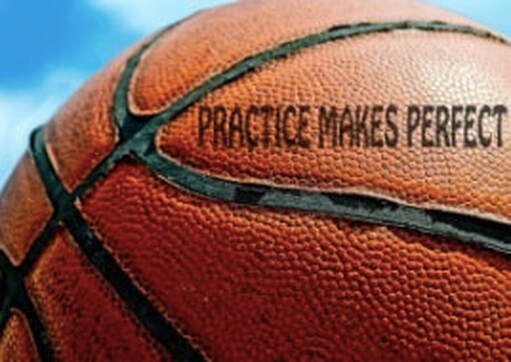|
Some people say, “Practice makes perfect!” It makes me wonder: What happens when you practice doing something the wrong way? Will you really improve or simply get better at doing it wrong? I suppose that’s why Vince Lombardi said, “Practice does not make perfect. Only perfect practice makes perfect.” Jesus had something to say about perfection; he told us to "Be perfect, as your heavenly Father is perfect.”
Or, was he inviting us to live life as God intended it to be lived: full and complete, loving God with our whole being, loving our neighbors as we love ourselves, allowing the Holy Spirit to give us the mind of Christ, enabling us to walk like Christ walked?
If the later is what Jesus meant, I need a little more practice! In the Church we call spiritual practice, Christian Discipleship. I prefer to think of spiritual practice as art. It sounds more fun and appealing to think of the Christian life as an art form we can get better at with practice. Beethoven once said, “Don’t only practice your art, but force your way into its secrets; art deserves that, for it and knowledge can raise man to the Divine.” If we want to perfect the art of our lives we may need to force our way into the secrets of God’s kingdom; the kingdom deserves our exploration! Spending time with Jesus, watching how he lived and loved others, creating space in our hearts and our minds and our days for his Holy Spirit to indwell and inspire us, will raise us closer to God’s heart. When it comes to life, Jesus is the master artist; he knows better than anyone else the secrets of the kingdom of God and what it means to be truly human. Perhaps we need to ask him to show us how to practice life more perfectly.
0 Comments
In the morning, as I savor my first cup of coffee, I remind myself to Think Red. I want to take the words of Jesus (the ones printed in red in my Bible) seriously and assume he meant for me to do the things he said.
I find some of the things Jesus said hard to understand; but most of his sayings are simple to comprehend yet hard to put into practice. Even simple things like, love your neighbor as you love yourself or his treat others as you want to be treated rule are easy to understand but difficult to pull off. Knowing and loving ourselves takes intentional effort and a steady diet of soul–searching discipline. In his book, The Wisdom of the Desert, Thomas Merton writes, “What can we gain by sailing to the moon if we are not able to cross the abyss that separates us from ourselves? This is the most important of all voyages of discovery, and without it all the rest are not only useless but disastrous.” If we have any hope of loving others well, we must first discover and love ourselves. Knowing what motivates us, understanding why we do what we do, looking beneath our hopes, dreams and desires to see what inspires them, doing the hard work of healing damaged emotions from past trauma are all part of the inward journey that Merton is pointing to. I’m encouraged to take the voyage of self–discovery when I remind myself that Jesus will lead the way. But loving myself is only half of the equation. I must learn from Jesus how to treat others as subjects of their own history rather than objects of my goodwill or affection? If loving myself requires intentional self–discovery of my subjective experience, I suppose loving others would call for the same. According to Merton, “Love means an interior and spiritual identification with one’s brother [or sister], so that he [or she] is not regarded as an “object” to “which” one “does good.” The fact is that good done to another as to an object is of little or no spiritual value. Love takes one’s neighbor as one’s other self, and loves him with all the immense humility and discretion and reserve and reverence without which no one can presume to enter into the sanctuary of another’s subjectivity.” Lord, help me love myself today and help me love my neighbor as my other self. Earlier this week I wrote a post called, Stop It! It was a self–disclosing confession about my anger issues and a ten–point plan on how to stop being so short-tempered. There’s a saying that goes, “Misery loves company!” I found the same to be true with anger. It was good for my soul—in a sad sort–of–way—to learn that 70% of all Americans report to be angry everyday. I wrote the post four days ago and I’ve only been angry four times . . . makes me wonder if there’s a flaw in my plan? Here’s the flaw: Plans to modify behavior that focus only on stopping the behavior seldom work. I believe “Do Plans” are better. Ask any alcoholic; cold–turkey plans to stop drinking seldom produce the result they want. Couple the plan to stop drinking with twelve things to do and the likelihood of success increases. I think a lot of people shy away from Christianity because they think the whole enterprise is about sin management—stopping bad behavior. Following Jesus is much more than sin management. Sure, Jesus challenges us to stop sinning; but more importantly he invites us to truly live. He wants us to “Do Life” in a way that increases our righteousness, joy and peace. Here are a few examples of his Stop and Do strategy from his Sermon on the Mount: STOP practicing your righteousness in front of people DO give to the needy in secret STOP praying like the hypocrites, using big words to impress others DO go into your prayer closet, close the door and pray to God who is unseen STOP storing up treasures for yourself on earth, where moths destroy & thieves steal DO store up treasures in heaven STOP worrying about your life, what you’ll eat and drink or the clothes you’ll wear DO seek first the kingdom of God and everything you need, will be given STOP judging others DO take the speck out of your own eye If the 70% of us—who get angry everyday—want more joy and less stress maybe we should follow the way of Jesus and add some whimsical, life-giving activity to our Stop It List. We can call it our “Stop and Do List.” To help you get started on your list I’ll share a few from mine: STOP complaining when my computer doesn’t cooperate
DO be grateful for the small things that are going right STOP rushing from one appointment to another DO slow down and savor the beauty around me STOP looking the other way, pretending I don’t see the homeless man on the corner DO introduce myself to the guy with the cardboard sign and ask his name STOP talking or thinking about something else when others are speaking DO listen to people when they’re talking and notice the color of their eyes STOP looking for the shortest checkout line at the grocery store DO take the longer line and use the extra time to pray for the cashier STOP saying mean things to the telemarketer DO hang up gently and pray they get a real job Thinking Red Together means taking the words of Jesus seriously, believing he meant for us to do the things he said. To Think Red sounds like an honorable goal to me but what do we do when the words Jesus said seem far out of reach? Here are four things from his Sermon on the Mount that are stretching me emotionally, mentally and spiritually: Don’t be angry with your brother or sister. Don’t call people names. If someone slaps you on the right cheek, turn to them the other cheek also. Love your enemies. I need to confess; these sayings are difficult for me because I have a growing issue with anger. I thought walking with Jesus for the past forty years would help me chill–out and be at peace with the world around me. The truth is, I was more easy–going ten years ago than I am now. Little things hack me off. It’s like I walk around on a thin layer of ice and when something doesn’t go my way the ice cracks and all kinds of impulsive anger emerges. But I cover it well. No one sees these emotional outbursts of rage, other than my wife Kathie. Come to find out, my experience is not that different than the majority of all Americans. ROTW certified studies indicate that 48% of Americans are angrier this year than ever in the past. 70% of all Americans report to be angry every day and 31% report they’re “really angry” every day. According to an article in Revival Outside the Walls, “Americans are twice as angry as they were 20 years ago. Almost a third of all American describe their anger as being seething, furious, and boiling mad. Almost 30% of us have at least one friend or relative who is unable to control their temper.” This means half of our population is angrier than they’ve ever been. How about you? Do you find yourself more agitated than you were pre–Covid? Is the civil unrest and the on–going issues of racism and hate in our country wearing you down? Does the economic disparity in our neighborhoods and financial insecurity keep you on edge? Do the technological tools we’ve created to make our lives easier irritate you because they seem to work for everyone except you? If so: Welcome to my world. This culture of anger—we find ourselves in—needs to see a Church that looks like Jesus. As followers of Jesus, we must do our part to “Stop The Hate!” We must find healthy ways to decompress our anger. We must, with God’s help, treat others (even those with whom we disagree) with decency and respect. Since I can’t stop the anger brewing in our culture, I’ve decided to make a personal list of ten things I can stop doing. I believe stopping these things will help defuse the anger brewing in my own soul. My personal “Stop It” list won’t change the world but it may change me! And a more peaceful me will be better equipped to help create a more peaceful world.
If you want to help “Stop the Hate” I encourage you to create your own personal Stop It list. Feel free to share your list in the comment section. In the mean time, I’m going to work my Stop It plan and begin crafting a Stop and Do plan. I’ll share it in my next post.
Today is July Fourth! The day mattresses go on sale, families gather for picnics, children light off fireworks all day and through the night; and most importantly, we celebrate the idea of freedom. We remind ourselves how fortunate we are to live in a country whose constitution is built on the cornerstone of freedom:
Today I’m reminded of how fortunate I am to live in a country that values freedom. However, I’m also reminded that many of my friends and fellow citizens have not benefited from the ideas expressed in our constitution. I’ll never forget the week I spent with Dr. John M. Perkins, an evangelical civil rights leader who has spent his entire life preaching, teaching and working to build communities based on God’s love; communities where justice, tranquility, welfare and liberty are experienced by all of its citizens, not a select few.
Dr. Perkins lives in Jackson Mississippi. The week of my visit with Dr. Perkins was the very week the Civil Right Museum in Jackson was to open. Dr. Perkins was given a private tour of the museum before the grand opening and he invited me to go on the tour with him. Surreal doesn’t come close to describing the experience of walking through the museum with this iconic civil rights leader; as he looked at the exhibits, with tears in his eyes, he shared his personal memories of those moments in time with me. On our ride back home he said, “Sometimes people ask me when I joined the civil rights movement!” He shook his head and with vehemence in his voice, he continued, “I didn’t join a movement. I was born wanting to be free!” All of us are born wanting to be free. Some of us experience the privilege and full benefit of living in a country built on the principles of freedom. It’s right and good to celebrate! However, as we celebrate our independence, let us not forget those who have struggled hard and long to gain their freedom. Let us also remember that some of our fellow citizens still struggle under oppressive systems that prevent them from knowing tranquility and welfare; some struggle to survive and provide for their families because of economic insecurity; still others face every day with mental illness and addiction without access to adequate healthcare. If you love and value the privilege of living free, as a part of your Fourth of July celebration will you recommit yourself to the work of insuring that all of our neighbors have access to the benefits of freedom? |
AuthorLarry Stoess is an author, public speaker, and urban church planter. He loves telling stories about how dreaming with God will empower people to make old and broken things new again. Larry and a band of friends founded the Church of the Promise in Louisville's Portland neighborhood; The Table, a pay-what-you-can community café; and Promise Housing Plus, a non-profit construction company. He has written about their experience of dreaming with God in his new book: Think Red. Archives
August 2023
Categories |
|
Contact Us |












 RSS Feed
RSS Feed